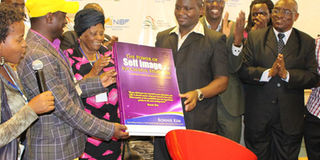Do not just criticise motivational books for no good reason

Bonnie Kim launches his latest motivational book, The Power of Self Image, in 2013. PHOTO | FILE |
What you need to know:
- One of the criticisms levelled against motivational books is that they are overly concerned with teaching only how to accumulate wealth.
- By his determination, he formed a boxing club, approached the city council for a training venue and, with a group of other young enthusiasts, approached a trainer recommended by the council.
Too often, those who are better off economically, socially and academically under-estimate the value and power of self-confidence, either because they have it and take it for granted or they do not believe that others can cultivate it.
Yet, when many people are starting out on their life journeys, they are often filled with self-doubt and lack of confidence despite their burning desire to become achievers. Think of the young man who lacks the courage to walk up to the girl of his dreams and express his feelings in words.
Think of the weeks that this love torments his heart, then one day he hears the song about the country boy who was in love with a Mexican girl, only she did not know it.
Emboldened by the lyrics, the boy summons all his courage, ignores his pounding heart and dry mouth and walks up to the girl, introduces himself and then tells her that he loves her. Motivational books work much the same way.
POVERTY
Take David Waweru’s book, Champion, first printed last year and reprinted this year. The publisher-turned writer, who is the CEO of WordAlive Publishers, narrates how, as a young man from a poor part of Nairobi, he yearned to become a champion boxer and how his life circumstances made his dream appear unreachable.
He was brought up by a single mother who had escaped from an abusive marriage, he knew no boxer and he had no money to buy equipment. In short, there was no one he could look up to for guidance.
Yet, by his determination, he formed a boxing club, approached the city council for a training venue and, with a group of other young enthusiasts, approached a trainer recommended by the council.
To raise the money to buy equipment and pay the trainer, they engaged in odd jobs and businesses, including staging discos. In the end, Waweru and the others became a champion boxers in the early 1980s.
How many young Kenyans are to be found in rural areas or slums today, all of them yearning to reach their dreams but who do not know where to start? How many of these potential champions would get a life-changing experience if they were to read Waweru’s book?
At the time I was reading this book, I was training my one-year-old son to walk. I discovered that his biggest challenge was not in the legs but the self-doubt in his head. Even when his body was willing and capable, he would not make that step until he was convinced he could. And that was where I came in.
BEHAVIOUR FOLLOWS BELIEF
That, generally speaking, is what motivational literature does to all those who look at their circumstances and declare: “I can’t do this.”
According to Waweru, behaviour always follows belief.
“Self-belief,” he argues, “can be a greater asset than previous experience: yet many of us allow lack of experience to keep us from trying.”
One of the criticisms levelled against motivational books is that they are overly concerned with teaching only how to accumulate wealth. In his book, however, Waweru says that money was not an end in itself for him.
Not so long ago, a friend posted on Facebook a story about how one Sunday, some ducks waddled into the equivalent of their church for a sermon and their preacher went on and on about how God had given them wings and that it was within the power of each duck to soar like an eagle.
“Amen,” the ducks shouted at every stage. But when the sermon was over, each waddled back to their homes in the pond.
This story illustrates a popular view held by critics of motivational literature; that the books preach a false gospel by promising more than they can deliver and creating hope where there is none.
The point, however, is that just as there are those who grasp the ultimate truth(s) through fiction or poetry, there are, too, those for whom motivational literature offers the path of enlightenment.
Mr Mbugua is a journalist and creative writer. [email protected]. Twitter: @NgangaMbugua





